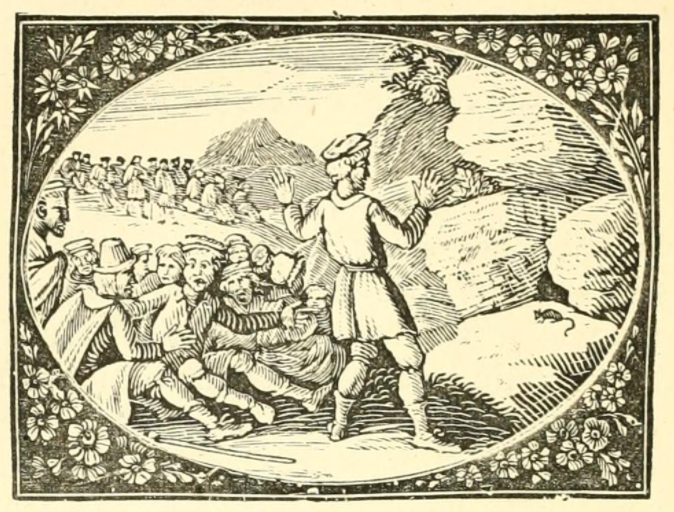1. γόνυ ~ γόνατος (neut.): knee
2. εἰκών ~ εἰκόνος (fem.): image, likeness
3. σημεῖον ~ σημείου (neut.): sign, omen
4. ὄρος ~ ὄρεος (neut.): mountain, hill
5. μισθός ~ μισθοῦ (masc.): wages, reward
Here are the proverbs and sayings:
4. ὄρος ~ ὄρεος (neut.): mountain, hill
5. μισθός ~ μισθοῦ (masc.): wages, reward
Γόνυ κνήμης ἔγγιον.
Ψυχῆς εἰκὼν ὁ λόγος ἐστίν.
Τί ἡ γενεὰ αὕτη ζητεῖ σημεῖον;
Ὤδινεν ὄρος, εἶτα μῦν ἀπέτεκεν.
Ὁ μισθὸς ὑμῶν πολὺς ἐν τῷ οὐρανῷ.
Plus some commentary:
Here is Bewick's illustration of the Aesopic fable about the mountain giving birth to a mouse:

Γόνυ κνήμης ἔγγιον.
The knee is closer than the shin.
As Erasmus explains, this saying refers to situations where there is a close allegiance — for example, a cousin — but an allegiance even closer: your brother. Forced to choose, you would choose to help your brother over cousin, just as the knee is closer (to your heart) than your shin. It can also be used to refer to self-interest. The proverbial saying appears in Aristotle and in Athenaeus. Greek γόνυ is cognate with English knee.
Ψυχῆς εἰκὼν ὁ λόγος ἐστίν.
Speech is the image of the soul.
From the Greek word εἰκὼν we get the English word icon. Meanwhile, the range of meaning of Greek λόγος is astounding, and it's always worth reviewing the Logeion entry. Depending on the context, for example, λόγος might also be translated here as "thought" rather than "speech."
Τί ἡ γενεὰ αὕτη ζητεῖ σημεῖον;
Why does this generation seek a sign?
The words are from the Gospel of Matthew, when Jesus rebukes the Pharisees. The Greek word σημεῖον gives us semiotics in English, the study of signs. The Greek word has a wonderful array of meanings as you can see in the Logeion entry, including birthmarks, landmarks, passwords and war-cries. Compare also English semaphore from Greek σῆμα.
Ὤδινεν ὄρος, εἶτα μῦν ἀπέτεκεν.
The mountain groaned in labor; then it gave birth to a mouse.
This saying became part of the Aesopic tradition: The Mountain in Labor. Erasmus provides Greek citations, along with the famous instance in Horace: Parturient montes, nascetur ridiculus mus. From Greek ὄρος we get orography in English, the scientific description of mountains.
Ὁ μισθὸς ὑμῶν πολὺς ἐν τῷ οὐρανῷ.
Your reward (will be) great in heaven.
The words come from Jesus in the Gospel of Luke at the end of the Beatitudes; you can find out more about that at Wikipedia: Beatitudes. The version in the Gospel of Matthew uses plural οὐρανοῖς instead: ὁ μισθὸς ὑμῶν πολὺς ἐν τοῖς οὐρανοῖς. For more about the Greek Sky God, Οὐρανός, see Wikipedia: Uranus.
Here is Bewick's illustration of the Aesopic fable about the mountain giving birth to a mouse:

Click here to subscribe/unsubscribe to the email list.
No comments:
Post a Comment